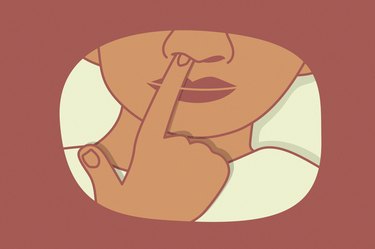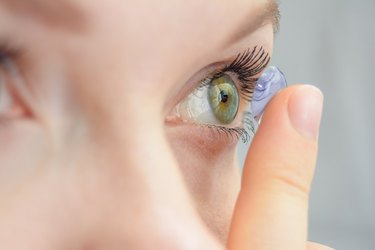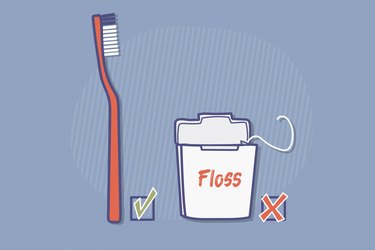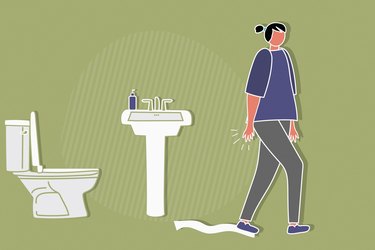
Nose picking probably isn't something you'd do in public. But when you're by yourself and you feel something up there, the urge to go digging can sometimes be pretty strong. Which might lead you to wonder: Is nose picking really that bad?
The truth is, snot surfing isn't going to kill you. But...it's not a great habit to have. "Nose picking is akin to other repetitive habits such as pimple popping or nail biting," says Cristen Cusumano, MD, an adult and pediatric ear, nose, and throat physician at ENT and Allergy Associates in Oradell, New Jersey. "While these behaviors are not necessarily medically recommended, the risk of causing a serious complication is quite low."
Video of the Day
Video of the Day
That's not to say nose picking gets a green light, though. Here's why, along with some simple tips to break the habit.
1. You Could Get Sick
That's right: Picking your nose could make you sick. Trying to catch the crust definitely poses the potential for spreading germs. We're talking viral illnesses like colds or the flu, sure. (Why do you think experts are constantly recommending to wash your hands?)
But picking your nose can also transfer some seriously nasty bugs, including ones that can cause pneumonia, found a January 2018 study in the European Respiratory Journal. Nose-pickers are also more likely to carry Staphylococcus aureus in their nose, which can cause staph infections, according to a June 2016 study in Infection Control & Hospital Epidemiology.
"Boogers and mucus in the nose serve the important purpose of trapping germs before they can make it deeper into the nasal passages and airways and lead to infection," Dr. Cusumano explains. "Nose picking can cause the transfer of these infectious particles onto the fingers," which can then find their way to your mouth and into your body.
And if illness-causing germs happen to be on your fingers before you pick, you could end up sending those into your nose and infecting yourself.
2. You Could Damage Your Nose
The tissue inside your nose is fairly delicate, and overly aggressive scratching (stubborn deep booger, anyone?) poses the potential for injury, especially if it's happening regularly. "Frequent nose picking can lead to trauma to the relatively fragile mucosa or inner lining of the nose, which can lead to nosebleeds or the starting point for an infection," Dr. Cusumano says.
Repeated scrapes or trauma could, over time, even start to affect the shape of your nose. "It can lead to scar tissue formation or even obstruction of the nasal airway," explains Dr. Cusumano. In rare instances, it's even possible for chronic picking to cause a perforation of the nasal septum, otherwise known as a hole in your nostril, noted an August 2018 case report in Cureus.
Are There Benefits to Picking Your Nose?
Other than the intense feeling of satisfaction that can come from pulling an annoying piece of gunk out of your nose, no. Remember, mucus and boogers exist to trap germs and particles and protect the lining of your nasal passage.
"The presence of mucus in the nose is normal and is best left alone," Dr. Cusumano says.
Is It OK to Eat Your Boogers?
Picking your nose and eating it is generally recognized to be pretty gross. But whether it's actually harmful is up for debate. Boogers are simply bits of dried nasal mucus, which your body is producing 24/7 to protect the lining of your nasal passages and trap germs and irritants, according to Nemours.
And in fact, we swallow most of the mucus we make without even realizing it. That's not so different from pulling a booger out of your nose and popping it into your mouth, say experts at the Ohio State University Wexner Medical Center.
Still, why take the risk? "In theory, since mucus serves to trap infectious particles before they enter the body, eating boogers can reintroduce these particles into the system and should be avoided," Dr. Cusumano says.
Plus, if there are other germs or gunk on your fingers already, you risk introducing those into your system along with your snot snack.
How to Stop Picking Your Nose (and What to Do Instead)
- Blow your nose: Using a tissue is a safer bet than picking, Dr. Cusumano says.
- Rinse it: A nasal saline rinse or spray can also be helpful for stubborn, crusty boogers. "These work by moisturizing and thinning any mucus that is lingering around the nose and help them to clear naturally," she adds.
- Identify your triggers: Of course, many of us pick without even realizing it, so it can be a tough habit to break. Identifying the triggers that cause you to pick — namely stress, boredom or anxiety — can help, notes the American Academy of Dermatology (AAD). Once you know what's driving that urge, you can take steps to avoid situations that may put you in a position to pick.
- Keep your hands busy: If you still get hit with the need to pick your nose, give your hands something else to do. Squeeze a stress ball, for instance, or grab a piece of silly putty to play with, the AAD recommends.
Finally, it never hurts to give yourself some extra insurance while you're working on stopping the snot-grabbing. To reduce the risk of scratching or spreading germs, keep your nails trimmed short and wash your hands frequently, recommends Children's Hospital Los Angeles.
So, How Bad Is It Really to Pick Your Nose?
Picking your nose isn't life-threatening. But even the occasional digging session can spread infection-causing germs and cause the inside of your nasal passages to get scratched or bleed, Dr. Cusumano notes. And if you're an intense picker, you run the risk of potentially damaging your nostril lining.
So if you catch yourself scooping up the snot, wash your hands and make it a point to try to break the habit.
- European Respiratory Journal: "Hands are vehicles for transmission of Streptococcus pneumoniae in novel controlled human infection study"
- Infection Control & Hospital Epidemiology: "Nose Picking and Nasal Carriage of Staphylococcus aureus"
- Cureus: "Chronic Rhinotillexomania Leading to Unilateral External Nare Stenosis"
- Nemours Foundation: "What's a Booger?"
- The Ohio State University Wexner Medical Center: "How harmful is it to pick your nose?"
- American Academy of Dermatology: "HOW TO STOP BITING YOUR NAILS"
- Children's Hospital Los Angeles: "Take the Pick Out of Nose Picking"
Is this an emergency? If you are experiencing serious medical symptoms, please see the National Library of Medicine’s list of signs you need emergency medical attention or call 911.



